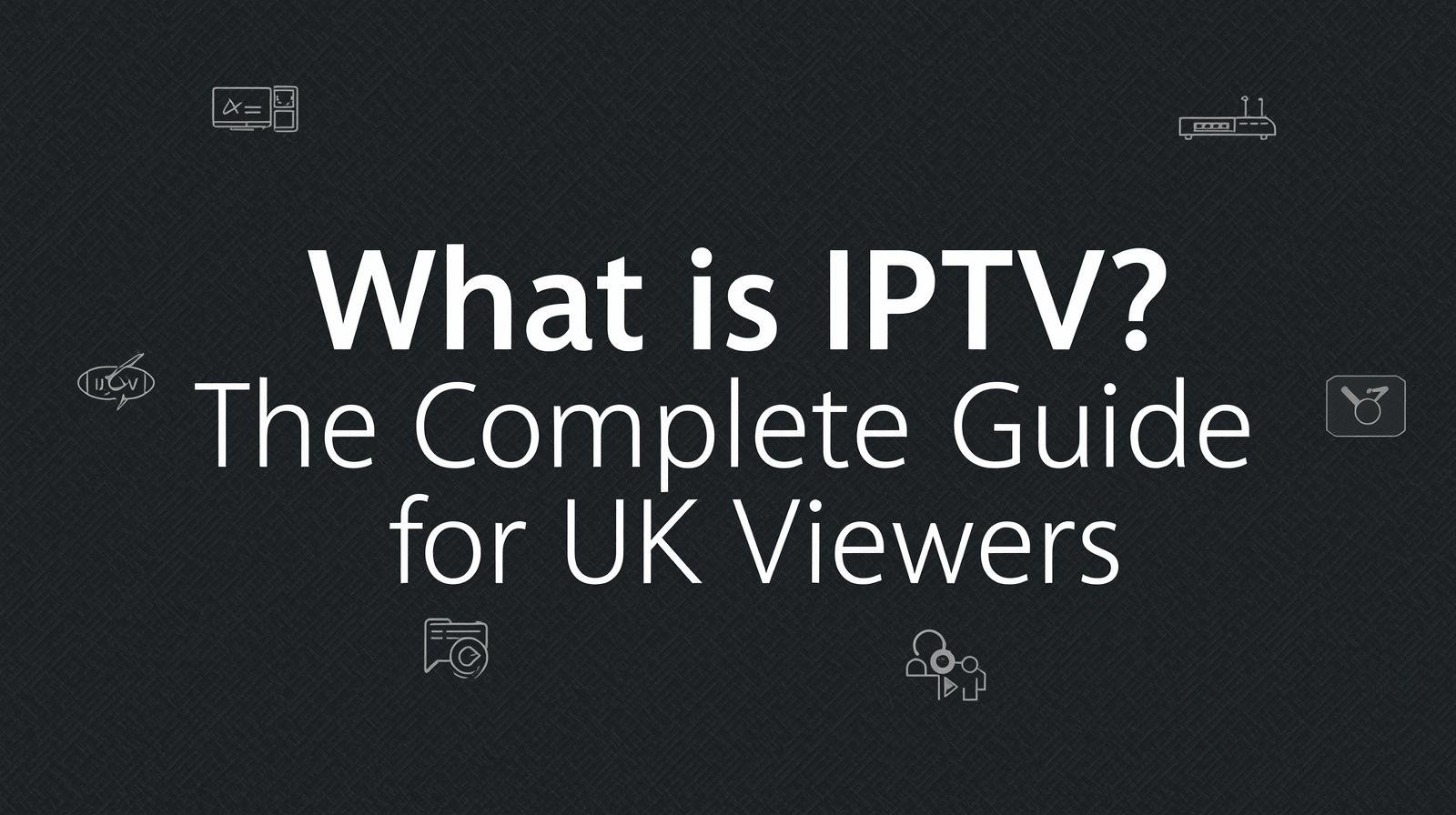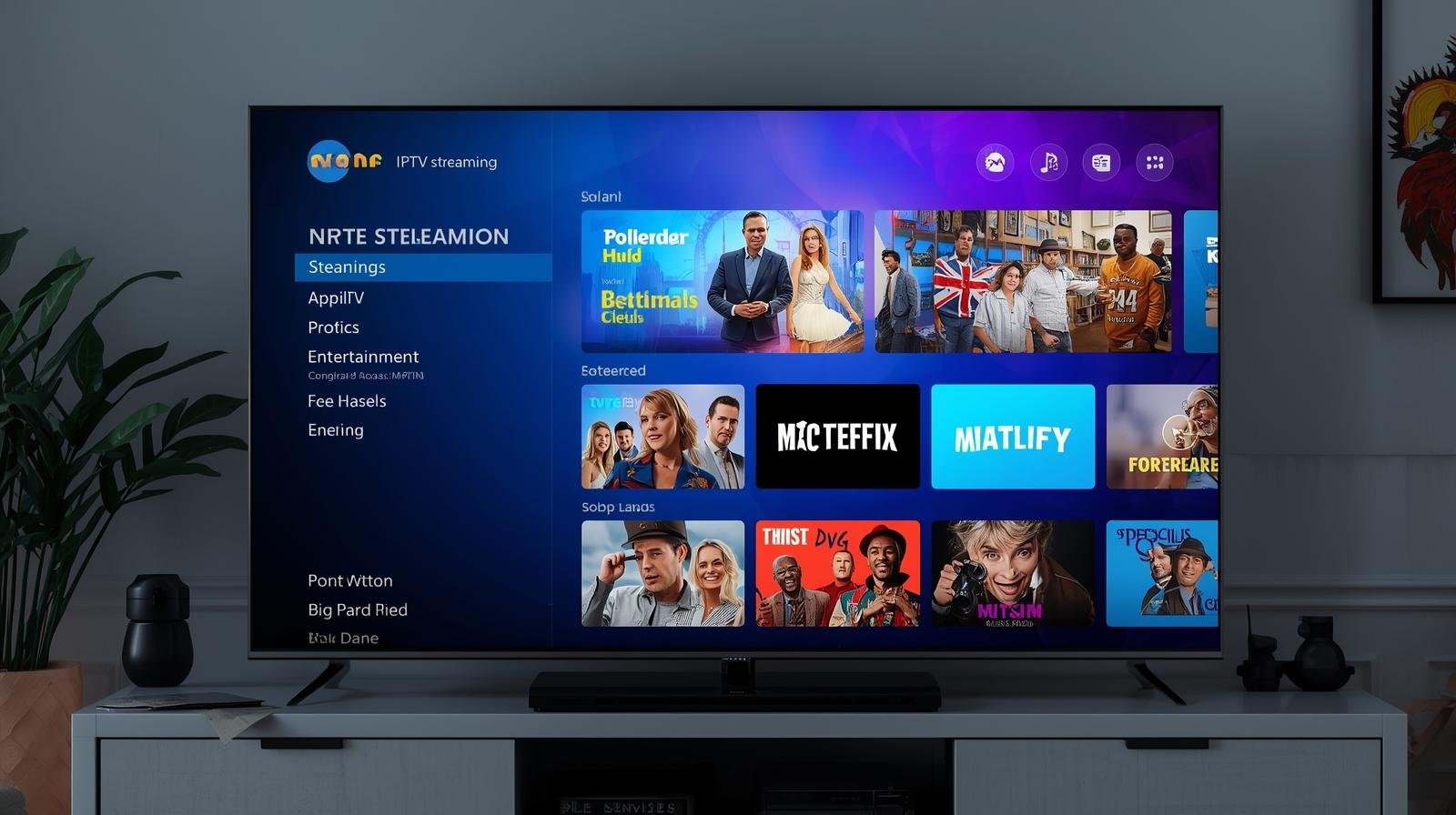Television in the UK has undergone seismic changes over the past two decades. Understanding IPTV in UK. From analogue broadcasts to Freeview, from Sky dishes on rooftops to on-demand streaming giants like Netflix, the way we watch TV continues to evolve. Now, we’re in the age of IPTV (Internet Protocol Television) — a new way of consuming television that combines the best of live TV, on-demand streaming, and multi-device access.
If you’ve heard the term but aren’t sure what it really means, or if you’re wondering whether it’s the right choice for your household, this complete guide to IPTV for UK viewers will walk you through everything.
1. What Is IPTV?
The Basic Definition
IPTV (Internet Protocol Television) is a system where television content is delivered over the internet, rather than through traditional satellite, cable, or terrestrial signals.
Instead of tuning into channels via a dish or aerial, IPTV uses your broadband connection to stream TV programmes, movies, and live events directly to your device.
Key Features of IPTV:
- Live TV: Watch channels in real time, just like with Sky or Freeview.
- Catch-up and On-demand: Watch programmes after they air.
- Multi-device access: Works on smart TVs, Fire Sticks, laptops, tablets, and even smartphones.
- Global reach: Access channels and libraries beyond the UK.
In short: if you’ve ever used BBC iPlayer, ITVX, Netflix, or NOW, you’ve already used a form of IPTV.
2. How Does IPTV Work?
At its core, IPTV works by converting TV signals into internet data packets. Understanding IPTV in UK. These packets travel through your broadband and are decoded by your device (TV, set-top box, or app).
Step-by-step:
- You launch an IPTV app.
- The app connects to the provider’s servers.
- The server streams video via your internet connection.
- Your device decodes and plays the video in real time.
Three Main IPTV Delivery Models:
- Live IPTV – Streaming live channels (e.g., BBC One live).
- Time-shifted IPTV – Catch-up TV or the ability to rewind/record shows.
- Video on Demand (VOD) – A library of films or series you can watch anytime (e.g., Netflix).
3. Types of IPTV Services in the UK
Free IPTV (Legal & Ad-supported)
- BBC iPlayer, ITVX, All 4, My5 – free catch-up apps.
- Pluto TV, Samsung TV Plus, Rakuten TV – FAST (Free Ad-Supported Streaming TV) channels.
Subscription IPTV (Legal & Paid)
- NOW (Sky’s app) – Sky Sports, Sky Cinema, and entertainment packages without contracts.
- Discovery+ – sports, documentaries, and Eurosport coverage.
- BT TV & Virgin Stream – IPTV-based bundles.
- Amazon Prime Video & Disney+ – technically VOD but part of the IPTV ecosystem.
Grey Market / Illegal IPTV
- Unlicensed providers selling “all channels” packages at £10/month.
- Often includes Sky Sports, Premier League, and PPVs without legal rights.
- Risk of malware, scams, and prosecution.
4. IPTV vs. Sky, Virgin Media & Freeview
📡 Sky & Virgin Media
- Require a dish or cable.
- Expensive (£70–£120/month).
- Long contracts.
- Excellent sports coverage but limited flexibility.
📺 Freeview
- Free but limited (70+ channels).
- No premium sports or movies.
- Requires aerial.
🌐 IPTV
- Affordable (£10–£40/month).
- Cancel anytime (no contracts).
- Works anywhere with internet.
- Combines live TV + catch-up + VOD.
Verdict: IPTV wins on affordability and flexibility, but premium sports are still a key reason some stick with Sky/Virgin. Understanding IPTV in UK.
5. Legal vs. Illegal IPTV in the UK
This is one of the most important distinctions UK viewers need to understand.
Legal IPTV
- Provided by licensed broadcasters (BBC, ITV, Sky via NOW, BT Sport via Discovery+).
- Comes with consumer protections.
- Stable, high-quality streaming.
Illegal IPTV
- Services selling “all channels” for a few pounds.
- No broadcasting rights.
- Frequently shut down by UK authorities.
- Risks: fines, data theft, or sudden service loss.
👉 Tip: If it seems too cheap to be true, it probably is.
6. Devices & Apps for IPTV
You don’t need fancy equipment. Just a good broadband connection and a device:
Devices:
- Amazon Fire Stick 4K Max – cheap, portable, and Alexa-enabled.
- Apple TV 4K – premium option with superb performance.
- Nvidia Shield TV Pro – best for advanced users and gamers.
- Smart TVs (Samsung, LG, Sony) – many IPTV apps preinstalled.
- Android TV Boxes – flexible and powerful.
Apps:
- Official UK apps: BBC iPlayer, ITVX, All4, NOW.
- Sports apps: Discovery+ (TNT Sports, Eurosport).
- Third-party players: TiviMate, IPTV Smarters Pro (for licensed IPTV subscriptions).
7. Cost of IPTV in the UK
The cost varies widely depending on the provider.
- Free options: BBC iPlayer, ITVX, Pluto TV.
- Low-cost subscriptions: NOW Entertainment Pass (£9.99/month), Discovery+ (£6.99/month).
- Premium bundles: Netflix (£10.99+), Disney+ (£7.99), Prime Video (£8.99).
On average, a family can replace a £100+ Sky/Virgin bill with a mix of IPTV services for £30–£40/month.
8. Parental Controls & Kid-Friendly IPTV
One concern for families is safety. Thankfully, IPTV offers robust controls:
- BBC iPlayer & ITVX – parental lock PINs.
- Netflix & Disney+ – kids’ profiles with age restrictions.
- NOW TV – parental PIN for live and on-demand.
- TiviMate/IPTV Smarters – allow parents to restrict certain channels.
This makes IPTV safer than traditional TV, where kids could stumble across inappropriate channels.
9. The Future of IPTV in the UK
By 2030, IPTV will likely become the default way Britons watch television.
Trends:
- FAST Channels (Free Ad-Supported TV) growing rapidly.
- AI recommendations making TV more personalised.
- 5G + fibre broadband ensuring 4K/8K streaming without buffering.
- Interactive sports (choose your camera angle, see live stats).
- Decline of satellite dishes — Sky already pivoting to Sky Glass (internet TV).
The UK is moving towards a fully IP-based television ecosystem.
10. Is IPTV Right for You?
Ask yourself:
- Do you want to cut expensive contracts?
- Do you want TV on multiple devices, even when travelling?
- Do you want more control over what you pay for?
If the answer is yes, IPTV is the smart choice — provided you stick with legal, licensed providers.
Conclusion
In the UK, IPTV is the way of the future. It blends the live, scheduled feel of traditional TV with the flexibility and affordability of streaming. Understanding IPTV in UK.
For families, students, and even retirees, IPTV offers choice, savings, and convenience. But the golden rule is this: always choose legal providers to ensure quality, safety, and peace of mind.
As 2025 unfolds, the TV landscape in Britain is being rewritten — and IPTV is leading the charge.

